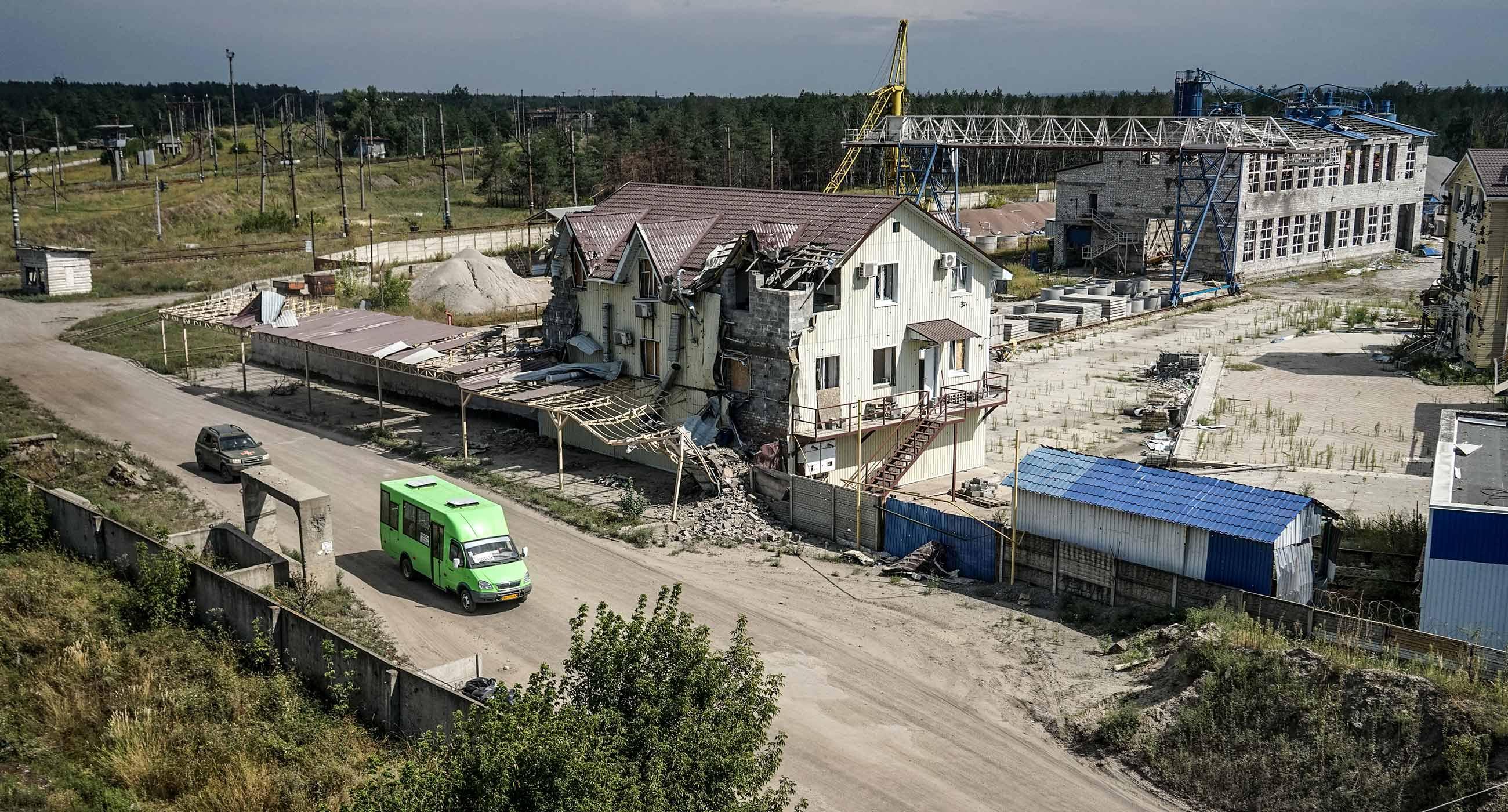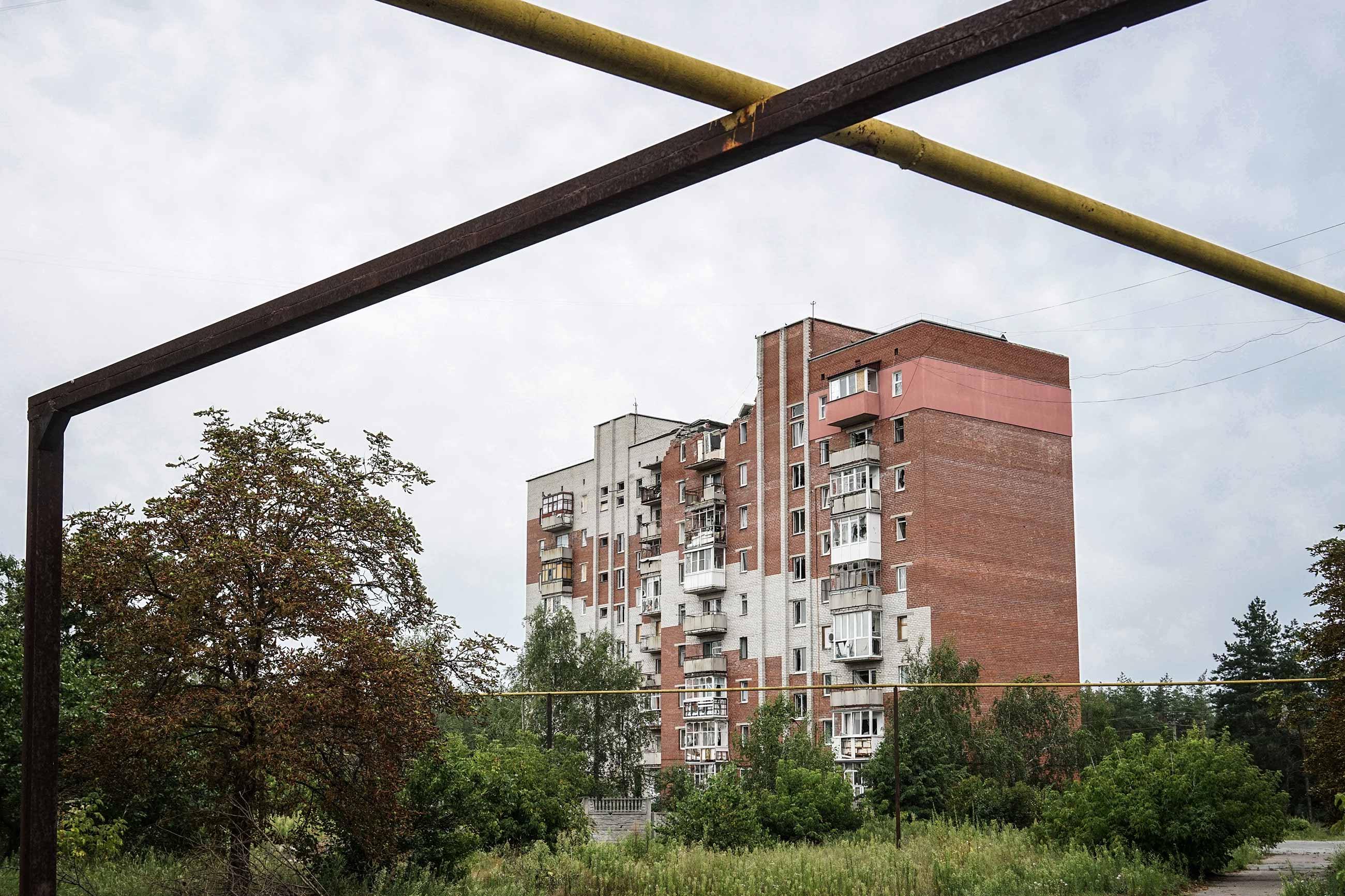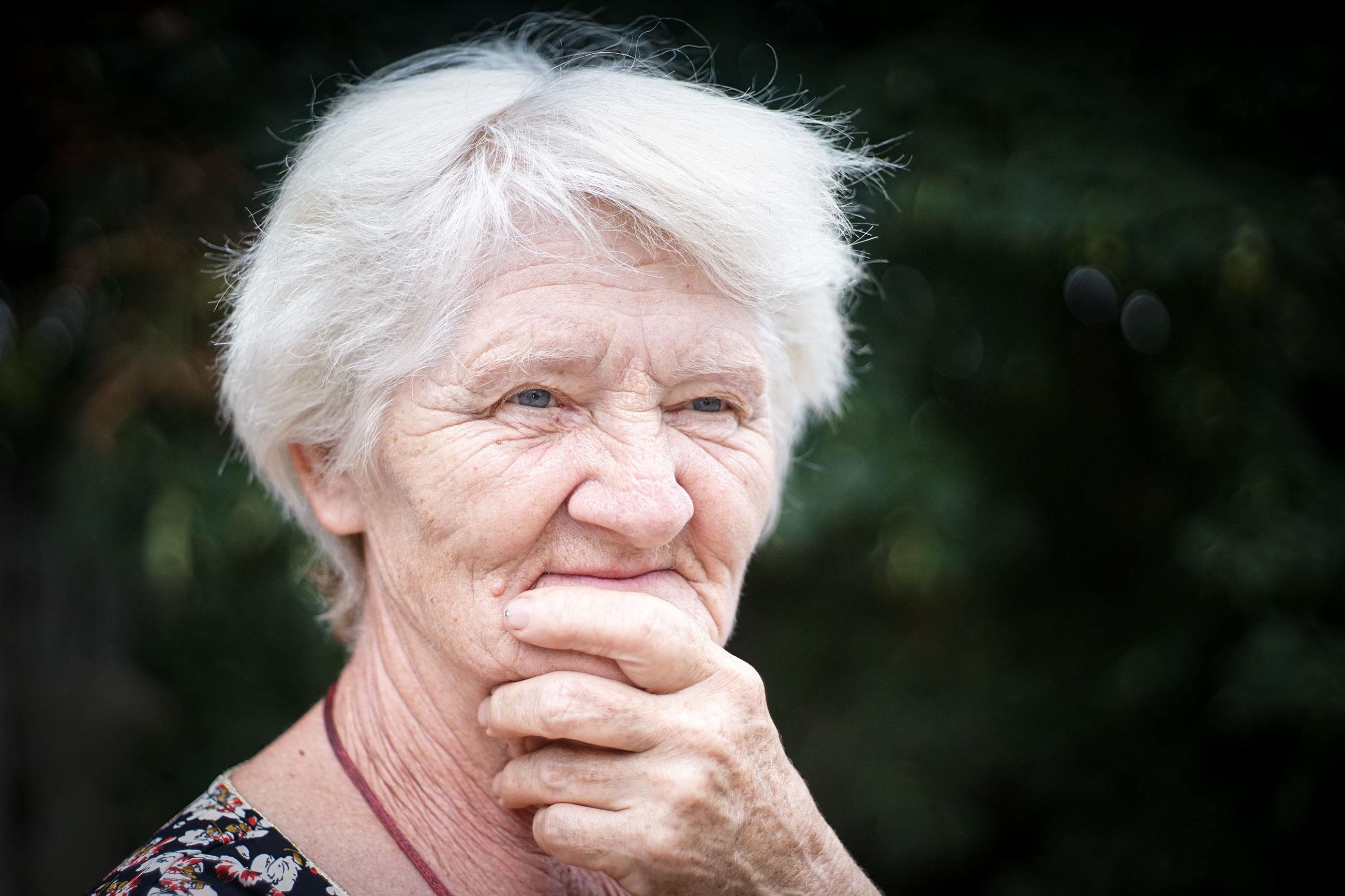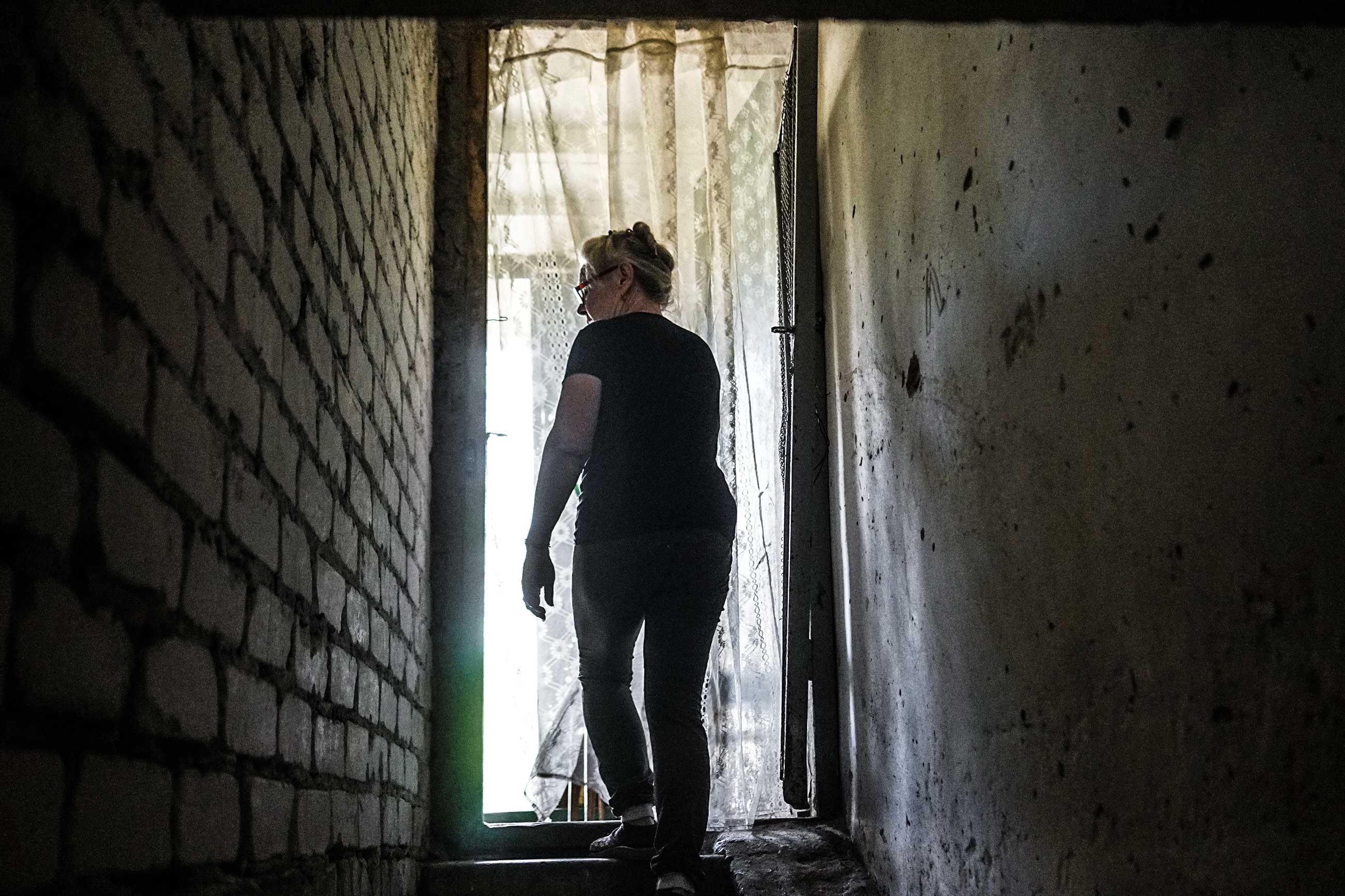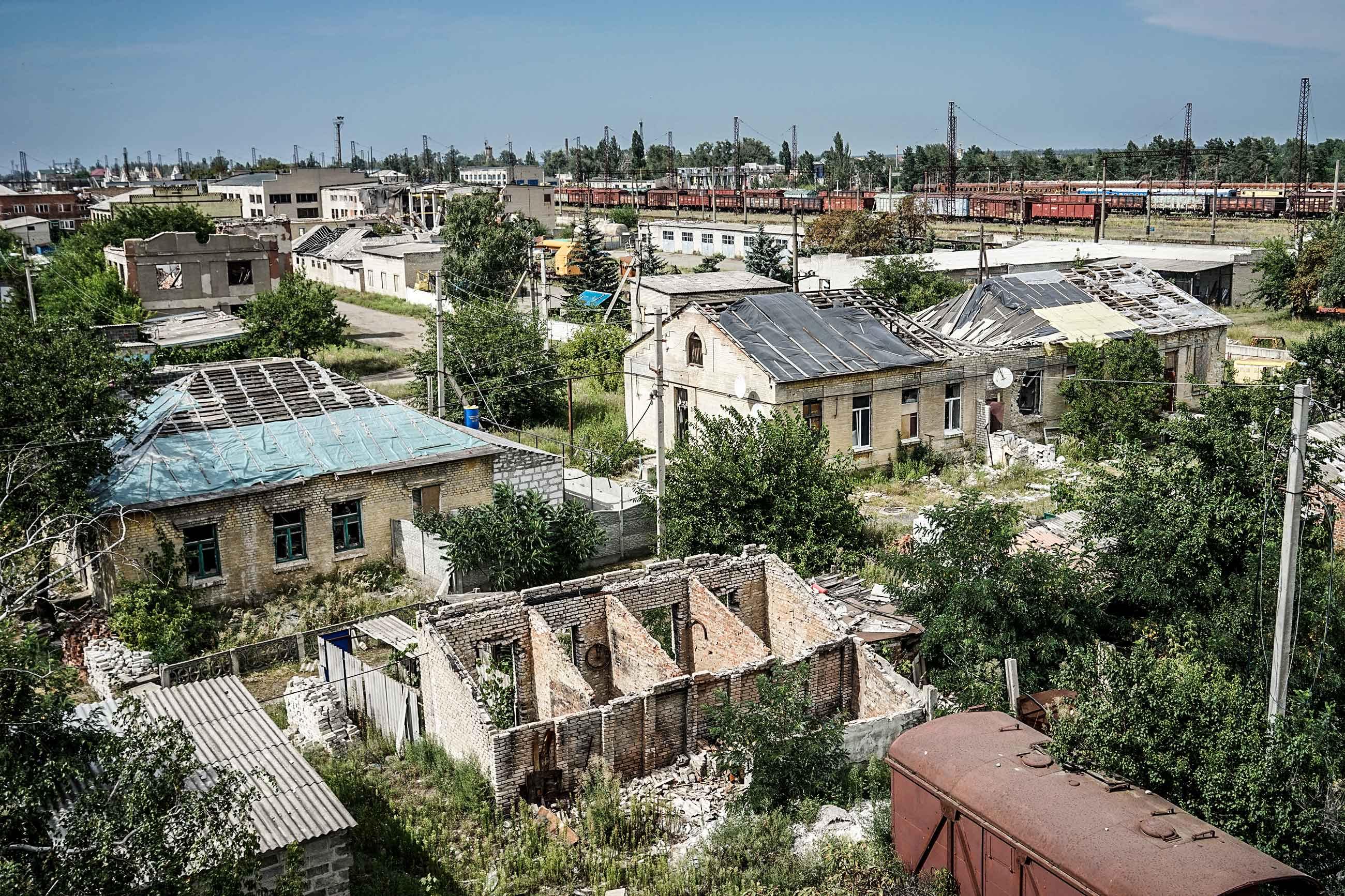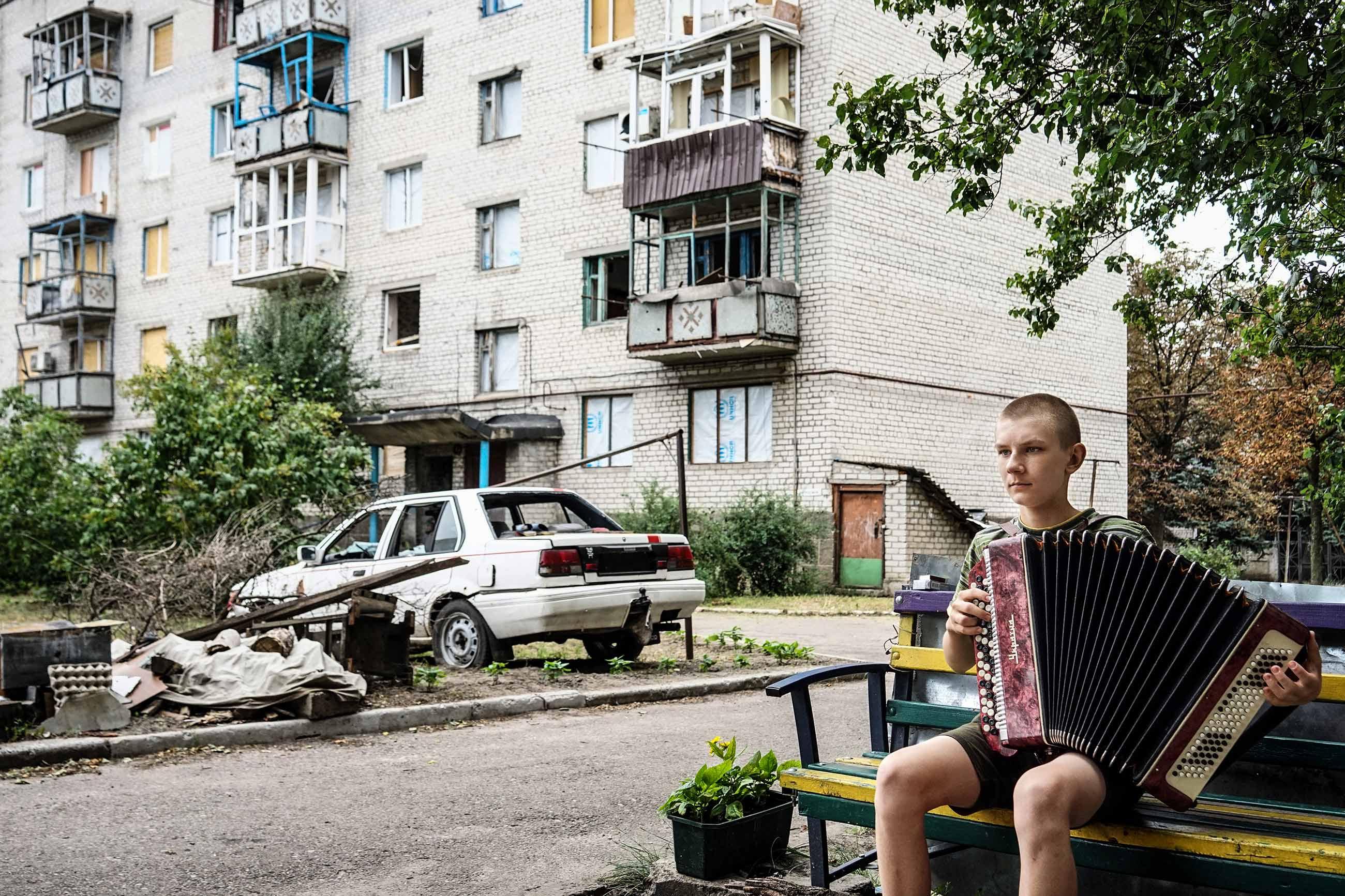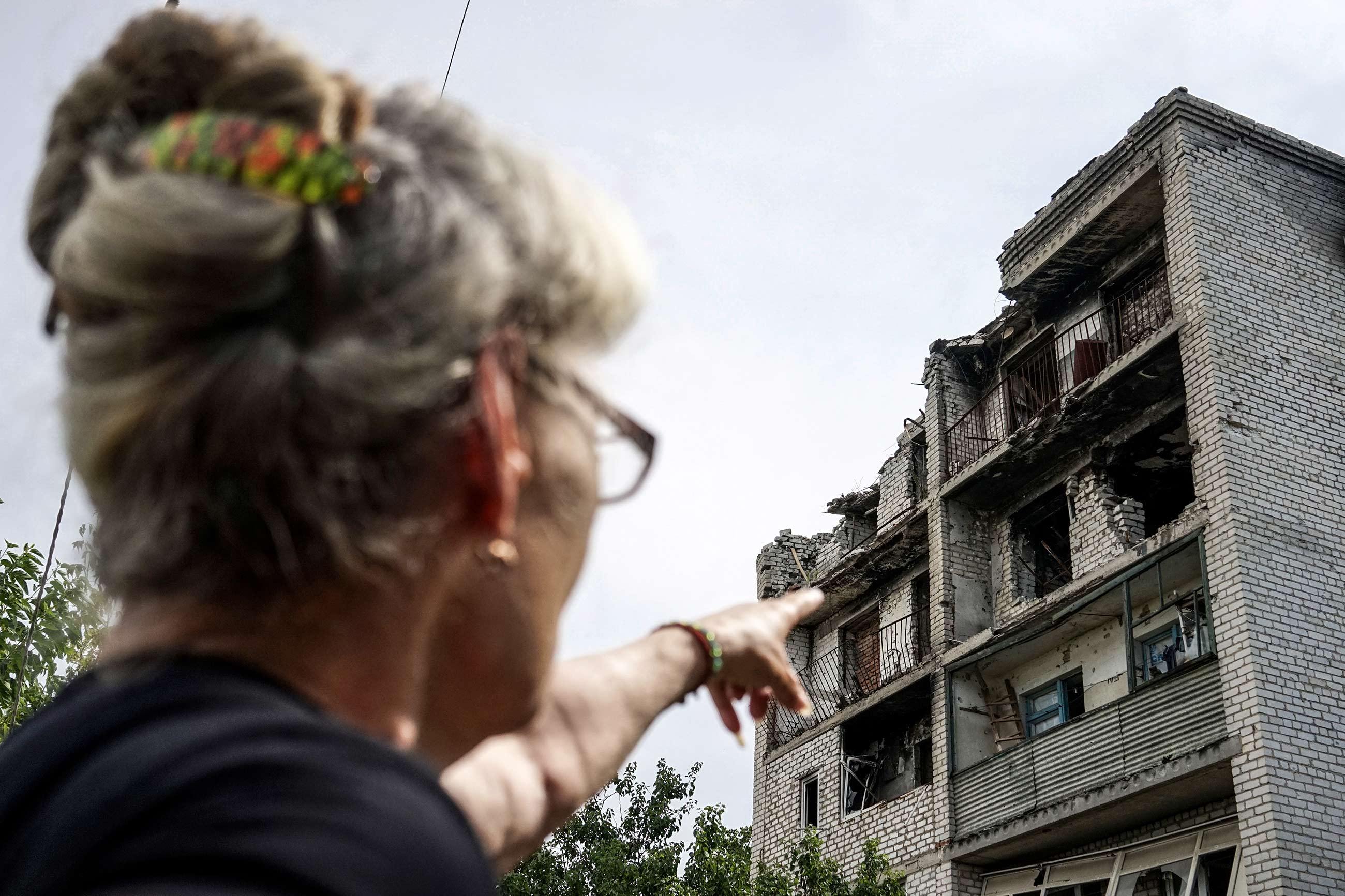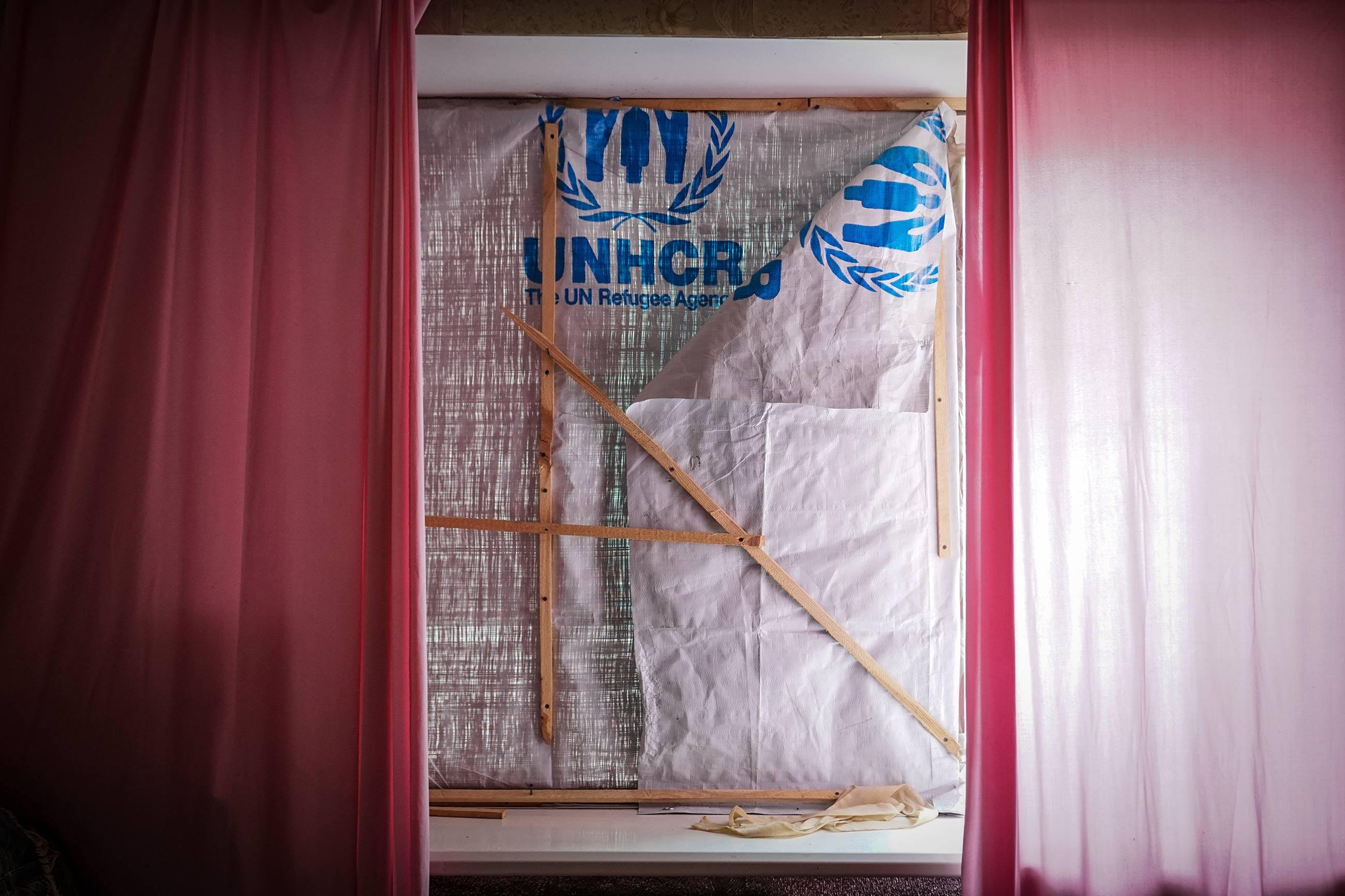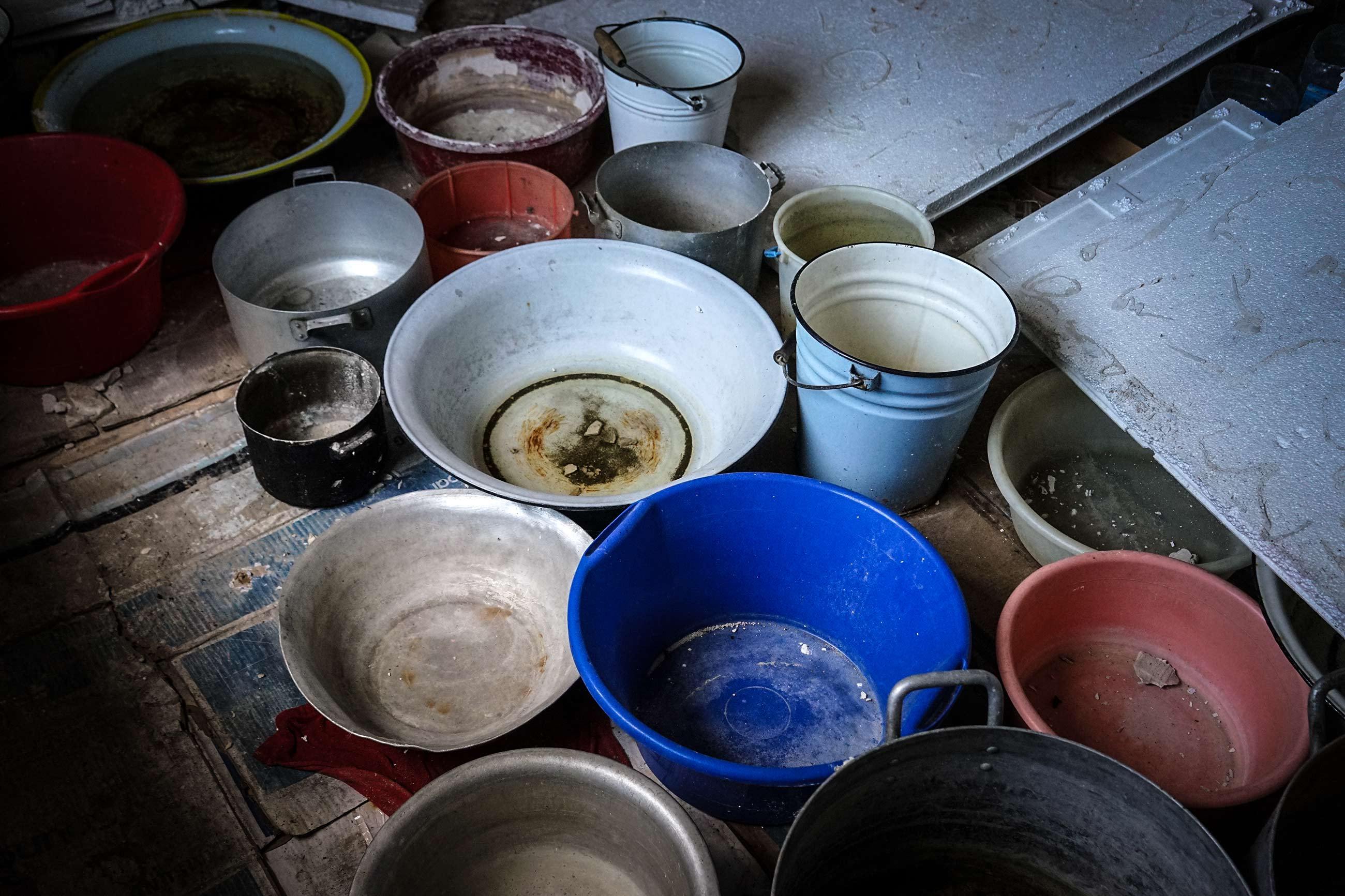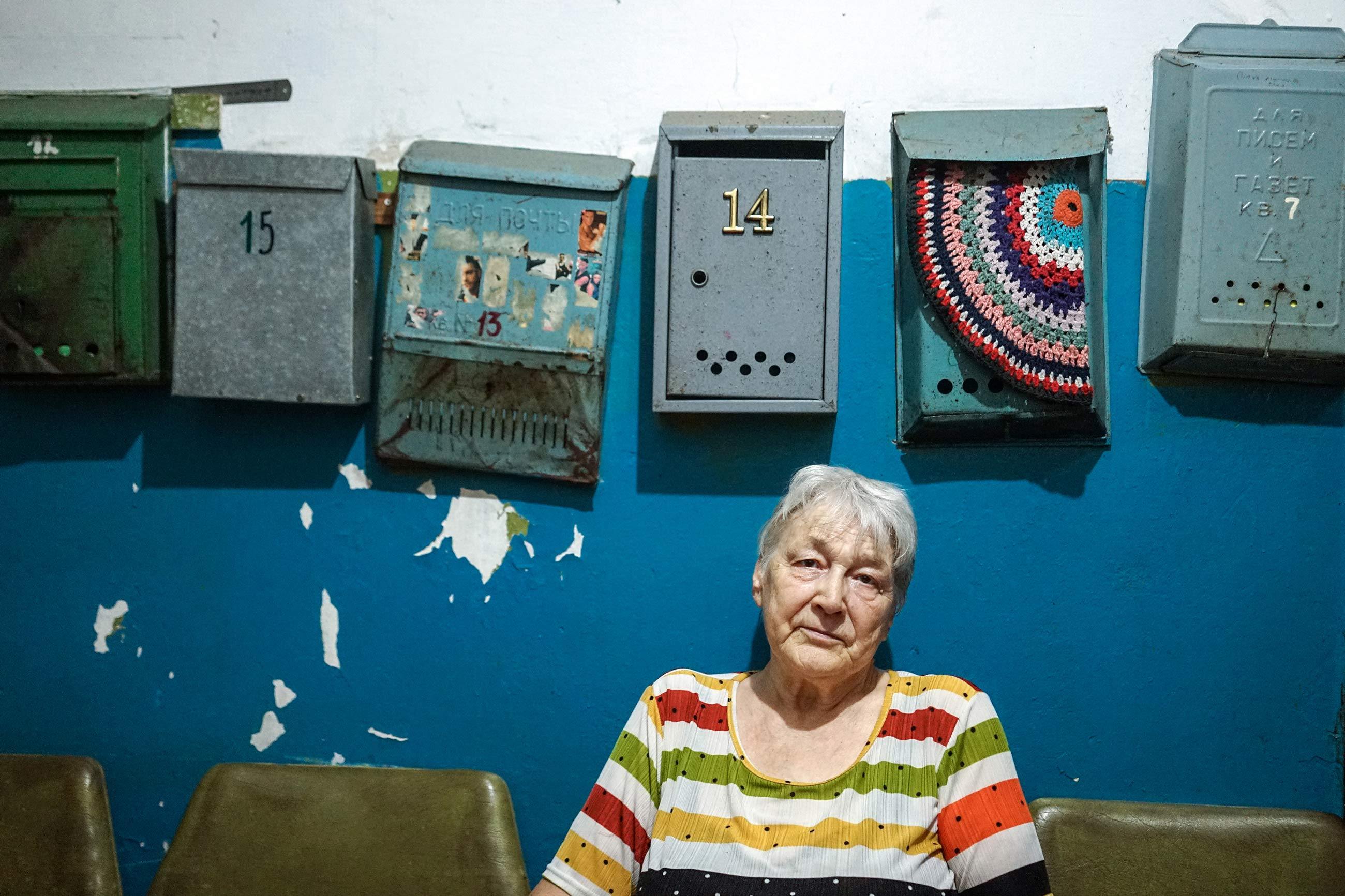Lyman is located 15 kilometers from the front line. The city survived four months of occupation and was liberated in October 2022. It is regularly shelled with missiles. But civilians remain here — there are about 5,000 of them in Lyman. Many of them settled in basements a year and a half ago. Zaborona journalist Polina Vernyhor visited the city and described how pigeons have taken over dilapidated apartments and locals have settled underground.
Hello again, Lyman
I visited Lyman for the first time in mid-October 2022, a few weeks after the liberation from Russian occupation. We were traveling there from Kharkiv through completely destroyed villages that seemed to have no people left, as almost every house there was either entirely or half destroyed. After the massive shelling and fighting for the city, the roads were littered with shell fragments and buildings, skinny dogs with frightened eyes roamed the streets, and the smell of burning was in the air.
However, this smell could not compete with the stench of the exhumation of the dead and injured during the four months of occupation. At that time, the bodies of 146 Ukrainians were retrieved from at least 25 mass graves —ukrainian soldiers tortured by Russians, locals killed by shells and bullets, including at least five children.
In October of last year, we failed to record local stories about the occupation. Several men from the queue for social security payments reacted aggressively to my requests in Ukrainian and threatened to beat the cameraman if we didn’t leave.
However, we were unable to leave the city that day. The bridges across the Siverskyi Donets leading to Kramatorsk were blown up, the pontoon crossing had not yet been built, and the cars were transported from one bank to the other by a ferry that worked until 6 p.m. We did not expect a queue to cross, so we did not make it and spent the night in the car.

A multi-apartment building damaged by Russian shelling in the central part of the city of Lyman. Photo: Ivan Chernichkin / Zaborona
In August 2023, we are heading to Lyman from Kramatorsk. Now we can cross the river by pontoon. Nothing seems to have changed along the way: on the sides of the road, we see the wreckage of shelled vehicles and burnt-out cars, broken wires hanging along the railroad tracks, and asphalt rolled out by heavy machinery creaks under the wheels.
At the entrance, we see the private sector. In the 10 months since the liberation, residents of many houses here have managed to patch up shell holes in the walls and roofs and board up windows. The same cannot be said about the rest of the city.
At one of the intersections, we enter the Appetit local grocery store. There are no price tags anywhere. The locals say it’s a special trick to sell food to the military at triple the price. I bought ice cream for 36 hryvnias — they probably saw the PRESS inscription on my bag and decided not to raise the price just in case. There is a terminal, but it doesn’t work. The saleswoman offers to transfer money to a card which number is printed on a piece of paper hanging on the counter.
Life among the ruins
At least 85% of Lyman’s housing stock has been damaged, and most of the infrastructure has been destroyed. Some high-rise buildings are now uninhabited, while in others there are only a few people per building. Amidst the eerie silence in the courtyards of deserted high-rises, one can occasionally hear a rumble. The imagination conjures up the ghosts of the residents killed by the missiles, whose phantoms never left their homes, either in life or after death. However, if you listen closely, the source of the sounds is birds that have settled in abandoned houses with broken windows. Lyman pigeons are the richest birds in the world, as now they have their own apartments.
Near one of the five-story buildings on Matrosova Street, we meet 69-year-old Valentyna Perekrestova with her two grandchildren. She is a quarter chief, which is the name given in Lyman to a person who represents the community of a particular quarter of the city. Valentyna’s responsibilities include communicating with volunteers and local authorities, distributing humanitarian aid to residents, and spreading important news.
Today, Valentyna is tidying up her yard: she is breaking and bringing together the branches that have fallen after the shelling, while 14-year-olds Sonia and Fedia are sweeping the entrance. There are no windows in Valentyna’s apartment, so she will probably have to spend the winter in the basement with a stove. The mountain of branches that gathered near the house will serve as a firewood reserve.

Valentyna Perekrestova. Photo: Ivan Chernichkin / Zaborona
“We were given tarpaulin to cover the windows. So far, so good, it saves us from the rain. But it will probably be cold in the winter. We wrote an application for firewood, but it hasn’t been delivered yet, so we will have at least some supply,” explains Valentyna.
Fedia’s second birthday
On February 13, it was snowing outside. Valentyna and her neighbors were cooking in the basement, while Fedia went upstairs to the apartment to catch the Internet connection.
“I had a break between classes and sat down to drink tea. At that moment, a shell parachuted outside the window and exploded in midair. I heard the window frame fall out and ran out into the entrance. Then I realized that something was wrong behind me. I put my hand to the back of my head and looked — my whole palm was covered in blood,” Fedir recalls.
Soldiers immediately came to his aid. They gave Fedir first aid and then took him to the hospital, where his wound was stitched up. According to the doctors, the guy was very lucky that the glass fragments did not penetrate his skull.
“I think he was saved by a thick curtain that kept a lot of broken glass out. Otherwise, he would have gotten more. The doctor who stitched up the wound said later that we could celebrate his second birthday,” says Valentyna.
Fedia and Sonia are cousins. Fedia’s mother lives with them, and today she is at work. Her sister, Sonia’s mother, was wounded in the neck and chest two days before the occupation of Lyman when a shell hit her yard. The woman was taken to Dnipro for treatment and is still undergoing rehabilitation. A month later, the girl’s father died of a stroke in the basement. Sofia moved in with her grandmother.

A local resident comes out of the basement of a house in Lyman. Photo: Ivan Chernichkin / Zaborona 
A view of the Lyman railway station and the private sector of the city destroyed by Russian shelling. Photo: Ivan Chernichkin / Zaborona
Fedia notes that there is much less shelling now than there was a few months ago. However, Valentyna says, this morning they heard an explosion nearby. Although there is water and electricity in the apartment, the family tries not to stay there too long and spends most of their time either on the street or in the basement.
“We have to run into the apartment, grab something we need, and run back out. It’s scary. The fourth floor is a long way to go if something happens. And you don’t know if you’ll have time to get out. A shell can hit at any moment,” says the pensioner.
And there will be music
Valentyna’s family was offered to move to another part of the city, to an abandoned private house. But the woman admits that her soul is here, on Matrosova Street. All her friends and acquaintances are here, and it’s too far to walk from there. The neighbors left Valentyna the keys to their apartments. If she leaves, the quarter chief says, she will let people down.
“We’re very used to it, we’ve organized our lives in such conditions. Farmers come from the villages and bring milk to sell. When the milk turns sour, I collect the cream, and Fedia is happy: we’ll make sour cream. We live somehow, it’s a sin to complain,” says Valentyna and calls Fedia to show his talents to the guests from Kyiv.
Fedir disappears behind the door of the entrance and comes out a few minutes later with an accordion in hand. He sits down on a bench in front of the house and starts playing. At first, he plays the Ukrainian national anthem. Fedir learned the melody on the instrument and rehearsed it himself. The familiar melody echoes in the courtyard, half-enclosed by high-rise buildings, from the walls smashed by debris, and soars into the sky. The concert continues with “What a Moonlit Night,” followed by an old waltz.

14-year-old Fedir plays the accordion in the yard of his house in Lyman. Photo: Ivan Chernichkin / Zaborona
When full-scale war broke out, music lessons stopped. After the de-occupation, when the Internet appeared in Lyman, Fedia began to study with his teacher online.
The explosion that injured Fedia also took away his accordion: the shrapnel and blast wave made the instrument unrepairable. Then the music teacher found a man who agreed to lend him his old accordion for a while. Now the boy dreams of having his own instrument.
A place of its own
Valentyna informed the woman by phone that journalists from Kyiv had arrived and wanted to take a tour of the basement. So, when we approach the dilapidated four-story building, we are greeted by a pleasant woman with blonde hair, dressed in leggings with patch pockets and a fitted knitted T-shirt. She is Lyubov Surzhan, 67 years old.
Lyubov is one of the three residents of the house. The shell hit her apartment on the top floor, so she has to live in the basement. As soon as we go underground, it becomes difficult to breathe — it is very hot, humid and there is no fresh air. In the common room, the women cook on an electric stove. In the next room, there is a storage and a shelf for Misha the chinchilla. Misha’s cage is covered with a blanket.

Lyubov shows her apartment destroyed by Russian shelling. Photo: Ivan Chernichkin / Zaborona
A narrow corridor leads to the room where Lyubov lives. However, it’s hard to call it a room. There is a bed in a premise about two by two meters in size. It is very difficult for several people to stay in this room for a long time: the air runs out, and hot sweat appears on their temples. Lyubov has been living like this for a year and a half.
Nina, Lyubov’s neighbor, is the only one of the three residents of the building whose apartment survived. The windows in her flat are boarded up, and the walls are dented by shell fragments. But there is water and electricity, and the women come here to wash.
“We’re already used to our place. We are together — our entire neighborhood, where everyone knows each other, and we can turn to someone if we need anything. I’ve been to Dnipro and spent a month in Italy in my life, and no one needs us anywhere, just like in your Kyiv. As soon as they find out that we are from Donbas, they don’t even want to talk to us. So I know how we are treated, girl. I’d rather stay here in my basement,” the woman answers my traditional question, which is common in interviews in frontline cities, “Why don’t you leave?”

A boarded-up window in Nina’s apartment. Photo: Ivan Chernichkin / Zaborona
The women receive a lot of humanitarian aid. Nina says that they have accumulated so much that they send the excess to those in greater need, for example, to the Poltava region, “because the salaries there are low.” Nina notices my surprise and adds: “I have a moth eating products here, so why should other people starve? Let others eat. We share.”
Everything burned down
On May 25, 2022, the street where Lyubov’s house is located was shelled with mines. One of them hit the woman’s apartment. The next day, Lyman was under complete occupation. The Russians continued to shoot incendiary shells at civilian buildings. One of them hit the third floor and a fire started.
During the shelling, the residents were in the basement, which saved them. However, all the things in Lyubov’s apartment burned down. She even had to ask the volunteers for a change of underwear — there was nothing left.
We go up to the fourth floor. Starting from the third floor, the stairs are littered with debris from the walls and ceiling, and traces of fire are visible. Buckets and bowls stand between the stairs, where rainwater drains through the roof that has been broken through. There are four apartments on the top floor, two on each side. All the doors are smashed and vandalized. To get into Lyubov’s apartment, she has to climb over a mountain of bricks and plaster.

Lyubov in her destroyed apartment and in the basement room where she now lives in the town of Lyman. Photo: Ivan Chernichkin / Zaborona
Inside, it’s a total ruin. Only the walls remain of the apartment, and they are dilapidated. The floor is not visible because of a layer of glass and debris. Near the large hole where the windows used to be, there is a burnt-out gas stove and a burnt-out refrigerator. In the corner, there are bowls. This used to be the kitchen.
Tears well up in the woman’s eyes: she loved this apartment. Sometimes, Lyubov says, it still seems like it’s all just a bad dream like she’s about to wake up in her bed, go to the kitchen to make coffee, and sit by the windowsill overlooking the forest to read a book.
This apartment had three rooms and a separate bathroom. One of the rooms had an extensive library with over 200 books. Lyubov had been collecting them all her life, and now she has to ask her neighbors, who have moved out, to read the novels left in the surviving apartments.
“Sunshine, where are we needed? Okay, if I were as young as you, I might go to work. But I’m retired, who needs me? I should pay the utilities, buy food. So we live here. Do they give us humanitarian aid? Yes, they do. We get our pensions and buy whatever we need,” she explains.
Fighting against water and the housing office
Lyubov Pavlyuchenko is the senior in the house located on Pryvokzalny Lane. Her apartment survived, but the roof was heavily damaged by shells. As a result, her neighbor’s apartment on the fourth floor is regularly flooded. The water flows down the stairs and the walls to the first floor, where Lyubov lives.
“We have written to the housing office, the executive committee, and everywhere else. They keep promising us that they will fix our roof — temporarily, but it’s at least something. Recently, they told us to come for materials — a neighbor had a car, so he went. However, he was suddenly told that the owners of the apartment had to write an application for materials. But they had left. Their apartment was smashed — where are they going to live?” the woman begins her story from the doorway.
According to her, their house is supposedly registered, but the utility company has not yet gotten around to repairing the roof, although a similar problem has been solved in the neighboring house.

Rainwater collection bowls in one of the apartments in the building where Lyubov Pavlyuchenko lives. Photo: Ivan Chernichkin / Zaborona
The roof was pierced by rocket fragments in the spring of 2022. The blast wave shattered the windows. The staircase at the entrance is almost completely covered with buckets, bowls, cans, and pots. It had been raining for several days recently, and Lyubov didn’t have time to take all these bowls outside to empty them.
An elderly couple of doctors, their daughter, and a two-year-old grandson lived in the apartment on the top floor. In the fall, the family could not stand the cold from the broken windows and left for a safer region.
Now the place is in complete chaos: plaster has fallen from the ceiling, pieces of slabs have fallen off, and wallpaper is hanging from the walls, peeling off because of the dampness. There are black spots of mold and fungus everywhere. The floor is covered with utensils of various sizes.
“Look, where are they supposed to go here? It’s as if the housing office doesn’t understand that people simply don’t have a place to stay to go to write applications and then fix it all. The neighbor has a husband with a disability, a daughter, and a grandson — how can she leave them?” says Lyubov.
The woman regularly hauls water from the upper floors, so her apartment is saved from the flood. The general dampness inside the house still makes itself felt: Lyubov has already removed the fungus from the ceiling, and one of the planks that decorate the wall has become wet and started to fall off.

Lyubov Pavlyuchenko. Photo: Ivan Chernichkin / Zaborona
There are no windows left in Lyubov’s apartment, as in the homes of most residents of Lyman. However, after the explosions, with the help of her neighbors, she reinserted a plastic frame and chipboard instead of glass. “People have had worse,” she says.

